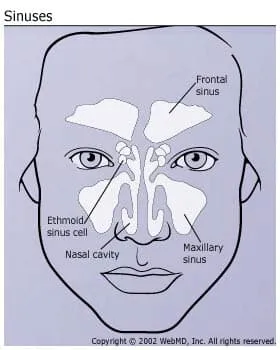Your sinuses are air-filled spaces inside your forehead, cheekbones, and behind the bridge of your nose. When inflamed — usually because of an allergic reaction or an infection — they swell, make more mucus, and the channels that drain them can get blocked.
The buildup of pressure in your sinuses causes pain that feels like a headache.
Sinus Headache Symptoms
You’ll feel a deep and constant pain in your cheekbones, forehead, or the bridge of your nose. The pain usually gets stronger when you move your head suddenly or strain. At the same time, you might have other sinus symptoms, such as:
- A runny nose
- A feeling of fullness in your ears
- Fever
- Swelling in your face

Other kinds of headaches that keep coming back, such as migraines or tension headaches, are often mistaken for sinus headaches. Because the treatment you need depends on the type of headache you have, it's important to figure out if your symptoms are caused by your sinuses. If a sinus blockage, such as an infection, really is the cause, you'll likely have a fever.
Usually, your doctor can tell if your sinuses are blocked based on your symptoms and a physical exam, but in some cases, you may need CT or MRI scans.
Sinus Headache Causes
The reason behind your sinus headaches can vary from person to person. Generally, it is because your sinuses get blocked or inflamed. Some causes for this include:
- Infections
- Allergies, particularly hay fever
- Polyps or growths in your nose
- Nose obstructions, such as a deviated (crooked) septum
- Dental problems
Sometimes, you can get sinus headaches or sinus pain without any inflammation. This could happen if you are exposed to secondhand smoke, perfume, or other chemicals you may breathe in.
Sudden changes in air pressure — like when you are on an airplane — can also cause sinus pain.
Sinus Headache Relief
The goal is usually to relieve your symptoms and treat an infection if you have one. You might take antibiotics, as well as antihistamines or decongestants for a short time. You can also use inhaled nasal decongestants, but only for up to three days. Longer use can make your symptoms worse.
You can also take pain relievers, or if they don't help, your doctor can prescribe corticosteroids to ease the inflammation in your sinuses. If an allergic reaction causes your sinus flare-ups, you might need a preventive allergy treatment.
You can also feel better with simple at-home tricks, such as drinking more fluids or using a humidifier or saltwater nasal spray.
It's also possible to ease sinus pain and pressure using a bioelectronic device that emits microcurrent waveforms. Sold over the counter, the device emits waves that target blood vessels and nerves to ease sinus congestion and pain.
If you take decongestant and pain-relieving medicines too often, you might get medication overuse headaches. It's important to consult your doctor if you have been using any medication for a long time to treat your headaches. Decongestants also can raise your blood pressure, so if you have high blood pressure, talk to your doctor before you take one.
In rare cases, they may advise sinus surgery to remove polyps or open up small or constantly swollen sinuses.
How to get rid of a sinus headache instantly
While there is no 100% reliable "instant cure," some things can ease a sinus headache quickly. They include:
- Apply warm compresses on congested areas.
- Drink plenty of water to keep your mucus thin and loose.
- Use a vaporizer or inhale steam. You can either boil some water in a pot or take a hot shower.
- Use a neti pot or some type of rinsing system.
- Use saltwater nasal sprays to clear your sinuses.
- Keep your head raised while you sleep.
Allergies and Sinus Headaches
Ever heard that allergies cause sinus headaches? It's not quite that simple.
Allergies can cause sinus congestion, which can make your head hurt. Treatment for your allergies can ease that congestion, but it won't relieve your headache pain. You usually have to treat the two conditions separately. See your doctor to get the right help.
Takeaways
Sinus headaches happen when your sinuses get blocked or inflamed, causing pain in areas such as your forehead, cheekbones, or nose. They can be triggered by infections, allergies, nasal issues, or even things such as smoke or changes in air pressure.
To treat sinus headaches, you can try pain relievers, decongestants, nasal sprays, and home remedies such as drinking fluids and using steam. In severe cases, a doctor might suggest surgery to clear blocked sinuses or remove polyps.
Allergies can cause sinus congestion, which may lead to headaches, but treating allergies won't necessarily stop the pain. You might need to address both the congestion and headache separately to feel better.
Sinus Headaches FAQs
How long should a sinus headache last?
Most sinus headaches usually last 7-10 days. If it lasts longer, you may want to see your doctor. You could have a migraine or a bacterial or fungal infection. In either case, you may need meds to help.
What drinks help sinus headaches?
To be clear, no drink can cure a sinus headache. However, keeping yourself hydrated with water and warm liquids like soup or tea can help soothe your sinus headache.
What triggers sinus infections and headaches?
Sinus infections and headaches can be triggered by viral or bacterial infections, allergies, polyps in your nose, a deviated septum, or dental problems. Secondhand smoke or even changes in air pressure can also be triggers for some people.

